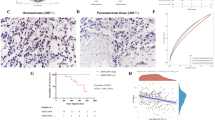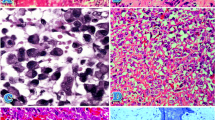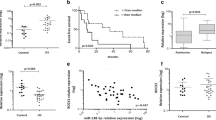Abstract
AT-rich interactive domain-containing protein 1A (ARID1A) has been shown to function as a tumour suppressor in various malignancies. However, the biological role of ARID1A in osteosarcoma is not clear. The present study aimed to investigate the expression pattern, prognostic value and the biological role of ARID1A in human osteosarcoma. ARID1A expression in 53 osteosarcoma surgical specimens was examined by quantitative real-time polymerase chain reaction, and its clinical significance was analysed. The role of ARID1A in cell proliferation, apoptosis, and metastasis were examined. ARID1A mRNA expression were significantly down-regulated in osteosarcoma tumours from that in matched adjacent non-tumour tissues. ARID1A expression was significantly inversely correlated with tumour stage and distant metastasis, as well as poor overall survival in patients with osteosarcoma. Furthermore, ARID1A mRNA was down-regulated in four human osteosarcoma cell lines MG-63, U2OS, HOS and Saos-2. Restoring of ARID1A expression in MG-63 and U2OS cells significantly inhibited cell proliferation and metastasis in vitro. Collectively, our data demonstrate that ARID1A may serve as a tumour suppressor in osteosarcoma progression, and represent a valuable prognostic marker and potential therapeutic target for osteosarcoma.



Similar content being viewed by others
References
Aljubran AH, Griffin A, Pintilie M, Blackstein M (2009) Osteosarcoma in adolescents and adults: survival analysis with and without lung metastases. Ann Oncol: Off J Eur Soc Med Oncol / ESMO 20(6):1136–1141. https://doi.org/10.1093/annonc/mdn731
Allo G, Bernardini MQ, Wu RC, Shih Ie M, Kalloger S, Pollett A, Gilks CB, Clarke BA (2014) ARID1A loss correlates with mismatch repair deficiency and intact p53 expression in high-grade endometrial carcinomas. Mod Pathol: Off J US Can Acad Pathol, Inc 27(2):255–261. https://doi.org/10.1038/modpathol.2013.144
Bitler BG, Aird KM, Garipov A, Li H, Amatangelo M, Kossenkov AV, Schultz DC, Liu Q, Shih Ie M, Conejo-Garcia JR, Speicher DW, Zhang R (2015) Synthetic lethality by targeting EZH2 methyltransferase activity in ARID1A-mutated cancers. Nat Med 21(3):231–238. https://doi.org/10.1038/nm.3799
Cho H, Kim JS, Chung H, Perry C, Lee H, Kim JH (2013) Loss of ARID1A/BAF250a expression is linked to tumor progression and adverse prognosis in cervical cancer. Hum Pathol 44(7):1365–1374. https://doi.org/10.1016/j.humpath.2012.11.007
Dhaini HR, Thomas DG, Giordano TJ, Johnson TD, Biermann JS, Leu K, Hollenberg PF, Baker LH (2003) Cytochrome P450 CYP3A4/5 expression as a biomarker of outcome in osteosarcoma. J Clin Oncol Off J Am Soc Clin Oncol 21(13):2481–2485. https://doi.org/10.1200/JCO.2003.06.015
Fadare O, Gwin K, Desouki MM, Crispens MA, Jones HW 3rd, Khabele D, Liang SX, Zheng W, Mohammed K, Hecht JL, Parkash V (2013) The clinicopathologic significance of p53 and BAF-250a (ARID1A) expression in clear cell carcinoma of the endometrium. Mod Pathol: Off J US Can Acad Pathol, Inc 26(8):1101–1110. https://doi.org/10.1038/modpathol.2013.35
Gemoll T, Epping F, Heinrich L, Fritzsche B, Roblick UJ, Szymczak S, Hartwig S, Depping R, Bruch HP, Thorns C, Lehr S, Paech A, Habermann JK (2015) Increased cathepsin D protein expression is a biomarker for osteosarcomas, pulmonary metastases and other bone malignancies. Oncotarget 6(18):16517–16526. 10.18632/oncotarget.4140
Guan B, Wang TL, Shih Ie M (2011) ARID1A, a factor that promotes formation of SWI/SNF-mediated chromatin remodeling, is a tumor suppressor in gynecologic cancers. Cancer Res 71(21):6718–6727. https://doi.org/10.1158/0008-5472.CAN-11-1562
He F, Li J, Xu J, Zhang S, Xu Y, Zhao W, Yin Z, Wang X (2015) Decreased expression of ARID1A associates with poor prognosis and promotes metastases of hepatocellular carcinoma. J Exp Clin Cancer Res 34:47. https://doi.org/10.1186/s13046-015-0164-3
Jones S, Wang TL, Shih Ie M, Mao TL, Nakayama K, Roden R, Glas R, Slamon D, Diaz LA Jr, Vogelstein B, Kinzler KW, Velculescu VE, Papadopoulos N (2010) Frequent mutations of chromatin remodeling gene ARID1A in ovarian clear cell carcinoma. Science 330(6001):228–231. https://doi.org/10.1126/science.1196333
Jones S, Li M, Parsons DW, Zhang X, Wesseling J, Kristel P, Schmidt MK, Markowitz S, Yan H, Bigner D, Hruban RH, Eshleman JR, Iacobuzio-Donahue CA, Goggins M, Maitra A, Malek SN, Powell S, Vogelstein B, Kinzler KW, Velculescu VE, Papadopoulos N (2012) Somatic mutations in the chromatin remodeling gene ARID1A occur in several tumor types. Hum Mutat 33(1):100–103. https://doi.org/10.1002/humu.21633
Kersting C, Gebert C, Agelopoulos K, Schmidt H, van Diest PJ, Juergens H, Winkelmann W, Kevric M, Gosheger G, Brandt B, Bielack S, Buerger H (2007) Epidermal growth factor receptor expression in high-grade osteosarcomas is associated with a good clinical outcome. Clin Cancer Res: Off J Am Assoc Cancer Res 13(10):2998–3005. https://doi.org/10.1158/1078-0432.CCR-06-2432
Kim MJ, Gu MJ, Chang HK, Yu E (2015) Loss of ARID1A expression is associated with poor prognosis in small intestinal carcinoma. Histopathology 66(4):508–516. https://doi.org/10.1111/his.12566
Li Y, Nakka M, Kelly AJ, Lau CC, Krailo M, Barkauskas DA, Hicks JM, Man TK (2016) p27 Is a Candidate Prognostic Biomarker and Metastatic Promoter in Osteosarcoma. Cancer Res 76(13):4002–4011. https://doi.org/10.1158/0008-5472.CAN-15-3189
McConechy MK, Ding J, Senz J, Yang W, Melnyk N, Tone AA, Prentice LM, Wiegand KC, McAlpine JN, Shah SP, Lee CH, Goodfellow PJ, Gilks CB, Huntsman DG (2014) Ovarian and endometrial endometrioid carcinomas have distinct CTNNB1 and PTEN mutation profiles. Mod Pathol 27(1):128–134. https://doi.org/10.1038/modpathol.2013.107
Nagl NG Jr, Wang X, Patsialou A, Van Scoy M, Moran E (2007) Distinct mammalian SWI/SNF chromatin remodeling complexes with opposing roles in cell-cycle control. EMBO J 26(3):752–763. https://doi.org/10.1038/sj.emboj.7601541
Park JH, Lee C, Suh JH, Chae JY, Kim HW, Moon KC (2015) Decreased ARID1A expression correlates with poor prognosis of clear cell renal cell carcinoma. Hum Pathol 46(3):454–460. https://doi.org/10.1016/j.humpath.2014.12.002
Suryo Rahmanto Y, Jung JG, Wu RC, Kobayashi Y, Heaphy CM, Meeker AK, Wang TL, Shih Ie M (2016) Inactivating ARID1A Tumor Suppressor Enhances TERT Transcription and Maintains Telomere Length in Cancer Cells. J Biol Chem 291(18):9690–9699. https://doi.org/10.1074/jbc.M115.707612
Torre LA, Bray F, Siegel RL, Ferlay J, Lortet-Tieulent J, Jemal A (2015) Global cancer statistics, 2012. CA Cancer J Clin 65(2):87–108. https://doi.org/10.3322/caac.21262
Wang DD, Chen YB, Pan K, Wang W, Chen SP, Chen JG, Zhao JJ, Lv L, Pan QZ, Li YQ, Wang QJ, Huang LX, Ke ML, He J, Xia JC (2012) Decreased expression of the ARID1A gene is associated with poor prognosis in primary gastric cancer. PLoS One 7(7):e40364. https://doi.org/10.1371/journal.pone.0040364
Wei XL, Wang DS, Xi SY, Wu WJ, Chen DL, Zeng ZL, Wang RY, Huang YX, Jin Y, Wang F, Qiu MZ, Luo HY, Zhang DS, Xu RH (2014) Clinicopathologic and prognostic relevance of ARID1A protein loss in colorectal cancer. World J Gastroenterol: WJG 20(48):18404–18412. https://doi.org/10.3748/wjg.v20.i48.18404
Wiegand KC, Shah SP, Al-Agha OM, Zhao Y, Tse K, Zeng T, Senz J, McConechy MK, Anglesio MS, Kalloger SE, Yang W, Heravi-Moussavi A, Giuliany R, Chow C, Fee J, Zayed A, Prentice L, Melnyk N, Turashvili G, Delaney AD, Madore J, Yip S, McPherson AW, Ha G, Bell L, Fereday S, Tam A, Galletta L, Tonin PN, Provencher D, Miller D, Jones SJ, Moore RA, Morin GB, Oloumi A, Boyd N, Aparicio SA, Shih Ie M, Mes-Masson AM, Bowtell DD, Hirst M, Gilks B, Marra MA, Huntsman DG (2010) ARID1A mutations in endometriosis-associated ovarian carcinomas. N Engl J Med 363(16):1532–1543. https://doi.org/10.1056/NEJMoa1008433
Wu JN, Roberts CW (2013) ARID1A mutations in cancer: another epigenetic tumor suppressor? Cancer Discov 3(1):35–43. https://doi.org/10.1158/2159-8290.CD-12-0361
Wu RC, Wang TL, Shih Ie M (2014) The emerging roles of ARID1A in tumor suppression. Cancer Biol Ther 15(6):655–664. https://doi.org/10.4161/cbt.28411
Wu RC, Ayhan A, Maeda D, Kim KR, Clarke BA, Shaw P, Chui MH, Rosen B, Shih Ie M, Wang TL (2014) Frequent somatic mutations of the telomerase reverse transcriptase promoter in ovarian clear cell carcinoma but not in other major types of gynaecological malignancy. J Pathol 232(4):473–481. https://doi.org/10.1002/path.4315
Yamamoto S, Tsuda H, Takano M, Tamai S, Matsubara O (2012) PIK3CA mutations and loss of ARID1A protein expression are early events in the development of cystic ovarian clear cell adenocarcinoma. Virchows Arch: Int J Pathol 460(1):77–87. https://doi.org/10.1007/s00428-011-1169-8
Yang SZ, Wang AQ, Du J, Wang JT, Yu WW, Liu Q, Wu YF, Chen SG (2016) Low expression of ARID1A correlates with poor prognosis in intrahepatic cholangiocarcinoma. World J Gastroenterol: WJG 22(25):5814–5821. https://doi.org/10.3748/wjg.v22.i25.5814
Yang L, Wei S, Zhao R, Wu Y, Qiu H, Xiong H (2016) Loss of ARID1A expression predicts poor survival prognosis in gastric cancer: a systematic meta-analysis from 14 studies. Sci Rep 6:28919. https://doi.org/10.1038/srep28919
Zang ZJ, Cutcutache I, Poon SL, Zhang SL, McPherson JR, Tao J, Rajasegaran V, Heng HL, Deng N, Gan A, Lim KH, Ong CK, Huang D, Chin SY, Tan IB, Ng CC, Yu W, Wu Y, Lee M, Wu J, Poh D, Wan WK, Rha SY, So J, Salto-Tellez M, Yeoh KG, Wong WK, Zhu YJ, Futreal PA, Pang B, Ruan Y, Hillmer AM, Bertrand D, Nagarajan N, Rozen S, Teh BT, Tan P (2012) Exome sequencing of gastric adenocarcinoma identifies recurrent somatic mutations in cell adhesion and chromatin remodeling genes. Nat Genet 44(5):570–574. https://doi.org/10.1038/ng.2246
Author information
Authors and Affiliations
Corresponding author
Ethics declarations
Competing interests
The authors declare that they have no competing interests.
Rights and permissions
About this article
Cite this article
Xu, N., Wang, L., Sun, P. et al. Low Arid1a Expression Correlates with Poor Prognosis and Promotes Cell Proliferation and Metastasis in Osteosarcoma. Pathol. Oncol. Res. 25, 875–881 (2019). https://doi.org/10.1007/s12253-017-0338-8
Received:
Accepted:
Published:
Issue Date:
DOI: https://doi.org/10.1007/s12253-017-0338-8




